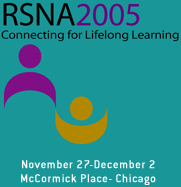
Abstract Archives of the RSNA, 2005
Serra Kamer, Presenter: Nothing to Disclose
Zeynep Ozsaran MD, Abstract Co-Author: Nothing to Disclose
Omur Celik, Abstract Co-Author: Nothing to Disclose
Deniz Yalman, Abstract Co-Author: Nothing to Disclose
Yasemin Bolukbasi, Abstract Co-Author: Nothing to Disclose
Oya Bildik, Abstract Co-Author: Nothing to Disclose
Ayfer Haydaroglu, Abstract Co-Author: Nothing to Disclose
et al, Abstract Co-Author: Nothing to Disclose
Purpose/Objective: Anxiety level among the patients with gynecological malignancy during intracavitary brachytherapy applications were evaluated and the factors influencing the scores were assessed. Materials/Methods: Anxiety level during intracavitary brachytherapy application and factors influencing anxiety level were evaluated in 146 patients with gynecological malignancy. The patients were evaluated in terms of quality of life and psychological status before each brachytherapy application using Hospital Anxiety and Depression scale (HADS). The total score was 21. The scores were grouped as follows:0-7= normal, 8-10=borderline, 11-21=abnormal.The patients were also questioned about factors which could affect the anxiety level such as marital status, education level, number of parity and whether they were operated or not. Results: : Between January 2003 and August 2004 , 146 cases were evaluated. Median age was 56 (range:27-80). Eighty-six patients had cervix uteri carcinoma and 63 had endometrial carcinoma. Sixty-seven patients were premenopausal , 85 patients were postmenopausal .The median parity number was 3 (range=0-10). Eighty-nine patients had at least three children. Sixty-seven patients were operated. One hundred twenty-five patients were married, 24 patients were unmarried or widowed. Before the treatment, the anxiety scores were normal in 49 patients(32%), borderline in 41 patients (28%), abnormal in 59 patients (40%). The scores were decreased in 69 patiens during the last application compared with the first application scores (p=0,00). Marital status, and parity number showed significant correlation with anxiety scores( p=0,04). Age, education level, having an operation or not had no significant correlation with anxiety level. Conclusions: Intracavitary brachytherapy causes anxiety in most of the patients. So the patients need to be given detailed information before the application and be prepared psychologically in order to tolerate this treatment .
Kamer, S,
Ozsaran, Z,
Celik, O,
Yalman, D,
Bolukbasi, Y,
Bildik, O,
Haydaroglu, A,
et al, ,
Evaluation of Anxiety Level during Intracavitary Brachytherapy Applications in Patients with Gynecological Malignancy. Radiological Society of North America 2005 Scientific Assembly and Annual Meeting, November 27 - December 2, 2005 ,Chicago IL.
http://archive.rsna.org/2005/4420760.html

